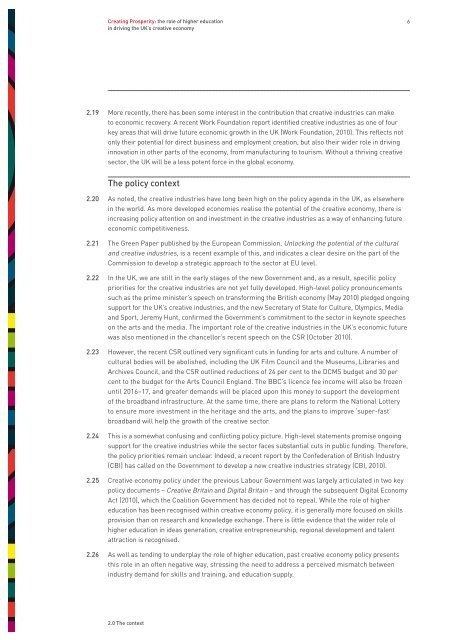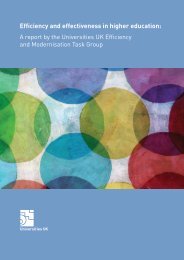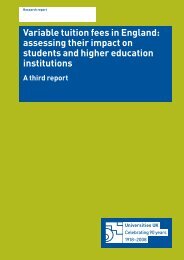Creating Prosperity: the role of higher education in ... - Universities UK
Creating Prosperity: the role of higher education in ... - Universities UK
Creating Prosperity: the role of higher education in ... - Universities UK
Create successful ePaper yourself
Turn your PDF publications into a flip-book with our unique Google optimized e-Paper software.
<strong>Creat<strong>in</strong>g</strong> <strong>Prosperity</strong>: <strong>the</strong> <strong>role</strong> <strong>of</strong> <strong>higher</strong> <strong>education</strong><strong>in</strong> driv<strong>in</strong>g <strong>the</strong> <strong>UK</strong>’s creative economy62.19 More recently, <strong>the</strong>re has been some <strong>in</strong>terest <strong>in</strong> <strong>the</strong> contribution that creative <strong>in</strong>dustries can maketo economic recovery. A recent Work Foundation report identified creative <strong>in</strong>dustries as one <strong>of</strong> fourkey areas that will drive future economic growth <strong>in</strong> <strong>the</strong> <strong>UK</strong> (Work Foundation, 2010). This reflects notonly <strong>the</strong>ir potential for direct bus<strong>in</strong>ess and employment creation, but also <strong>the</strong>ir wider <strong>role</strong> <strong>in</strong> driv<strong>in</strong>g<strong>in</strong>novation <strong>in</strong> o<strong>the</strong>r parts <strong>of</strong> <strong>the</strong> economy, from manufactur<strong>in</strong>g to tourism. Without a thriv<strong>in</strong>g creativesector, <strong>the</strong> <strong>UK</strong> will be a less potent force <strong>in</strong> <strong>the</strong> global economy.The policy context2.20 As noted, <strong>the</strong> creative <strong>in</strong>dustries have long been high on <strong>the</strong> policy agenda <strong>in</strong> <strong>the</strong> <strong>UK</strong>, as elsewhere<strong>in</strong> <strong>the</strong> world. As more developed economies realise <strong>the</strong> potential <strong>of</strong> <strong>the</strong> creative economy, <strong>the</strong>re is<strong>in</strong>creas<strong>in</strong>g policy attention on and <strong>in</strong>vestment <strong>in</strong> <strong>the</strong> creative <strong>in</strong>dustries as a way <strong>of</strong> enhanc<strong>in</strong>g futureeconomic competitiveness.2.21 The Green Paper published by <strong>the</strong> European Commission, Unlock<strong>in</strong>g <strong>the</strong> potential <strong>of</strong> <strong>the</strong> culturaland creative <strong>in</strong>dustries, is a recent example <strong>of</strong> this, and <strong>in</strong>dicates a clear desire on <strong>the</strong> part <strong>of</strong> <strong>the</strong>Commission to develop a strategic approach to <strong>the</strong> sector at EU level.2.22 In <strong>the</strong> <strong>UK</strong>, we are still <strong>in</strong> <strong>the</strong> early stages <strong>of</strong> <strong>the</strong> new Government and, as a result, specific policypriorities for <strong>the</strong> creative <strong>in</strong>dustries are not yet fully developed. High-level policy pronouncementssuch as <strong>the</strong> prime m<strong>in</strong>ister’s speech on transform<strong>in</strong>g <strong>the</strong> British economy (May 2010) pledged ongo<strong>in</strong>gsupport for <strong>the</strong> <strong>UK</strong>’s creative <strong>in</strong>dustries, and <strong>the</strong> new Secretary <strong>of</strong> State for Culture, Olympics, Mediaand Sport, Jeremy Hunt, confirmed <strong>the</strong> Government’s commitment to <strong>the</strong> sector <strong>in</strong> keynote speecheson <strong>the</strong> arts and <strong>the</strong> media. The important <strong>role</strong> <strong>of</strong> <strong>the</strong> creative <strong>in</strong>dustries <strong>in</strong> <strong>the</strong> <strong>UK</strong>’s economic futurewas also mentioned <strong>in</strong> <strong>the</strong> chancellor’s recent speech on <strong>the</strong> CSR (October 2010).2.23 However, <strong>the</strong> recent CSR outl<strong>in</strong>ed very significant cuts <strong>in</strong> fund<strong>in</strong>g for arts and culture. A number <strong>of</strong>cultural bodies will be abolished, <strong>in</strong>clud<strong>in</strong>g <strong>the</strong> <strong>UK</strong> Film Council and <strong>the</strong> Museums, Libraries andArchives Council, and <strong>the</strong> CSR outl<strong>in</strong>ed reductions <strong>of</strong> 24 per cent to <strong>the</strong> DCMS budget and 30 percent to <strong>the</strong> budget for <strong>the</strong> Arts Council England. The BBC’s licence fee <strong>in</strong>come will also be frozenuntil 2016–17, and greater demands will be placed upon this money to support <strong>the</strong> development<strong>of</strong> <strong>the</strong> broadband <strong>in</strong>frastructure. At <strong>the</strong> same time, <strong>the</strong>re are plans to reform <strong>the</strong> National Lotteryto ensure more <strong>in</strong>vestment <strong>in</strong> <strong>the</strong> heritage and <strong>the</strong> arts, and <strong>the</strong> plans to improve ‘super-fast’broadband will help <strong>the</strong> growth <strong>of</strong> <strong>the</strong> creative sector.2.24 This is a somewhat confus<strong>in</strong>g and conflict<strong>in</strong>g policy picture. High-level statements promise ongo<strong>in</strong>gsupport for <strong>the</strong> creative <strong>in</strong>dustries while <strong>the</strong> sector faces substantial cuts <strong>in</strong> public fund<strong>in</strong>g. Therefore,<strong>the</strong> policy priorities rema<strong>in</strong> unclear. Indeed, a recent report by <strong>the</strong> Confederation <strong>of</strong> British Industry(CBI) has called on <strong>the</strong> Government to develop a new creative <strong>in</strong>dustries strategy (CBI, 2010).2.25 Creative economy policy under <strong>the</strong> previous Labour Government was largely articulated <strong>in</strong> two keypolicy documents – Creative Brita<strong>in</strong> and Digital Brita<strong>in</strong> – and through <strong>the</strong> subsequent Digital EconomyAct (2010), which <strong>the</strong> Coalition Government has decided not to repeal. While <strong>the</strong> <strong>role</strong> <strong>of</strong> <strong>higher</strong><strong>education</strong> has been recognised with<strong>in</strong> creative economy policy, it is generally more focused on skillsprovision than on research and knowledge exchange. There is little evidence that <strong>the</strong> wider <strong>role</strong> <strong>of</strong><strong>higher</strong> <strong>education</strong> <strong>in</strong> ideas generation, creative entrepreneurship, regional development and talentattraction is recognised.2.26 As well as tend<strong>in</strong>g to underplay <strong>the</strong> <strong>role</strong> <strong>of</strong> <strong>higher</strong> <strong>education</strong>, past creative economy policy presentsthis <strong>role</strong> <strong>in</strong> an <strong>of</strong>ten negative way, stress<strong>in</strong>g <strong>the</strong> need to address a perceived mismatch between<strong>in</strong>dustry demand for skills and tra<strong>in</strong><strong>in</strong>g, and <strong>education</strong> supply.2.0 The context
















